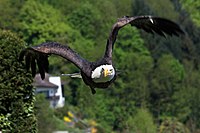MarshalN20 (talk | contribs) No edit summary |
MarshalN20 (talk | contribs) No edit summary |
||
| Line 95: | Line 95: | ||
The '''United States''', officially the '''United States of America''', is a country in northern [[North America]]. Its [[Contiguous United States|contiguous territory]] is bordered in the north by [[Canada]], in the south by [[Mexico]], in the west by the [[Pacific Ocean]], and in the east by the [[Atlantic Ocean]]. Its non-contiguous territory extends the [[Borders of the United States|country's borders]] worldwide. At {{convert|9.83|sqkm|abbr=off|sigfig=1|disp=flip}} in size, the U.S. is the [[List of countries and dependencies by area|fourth-largest country by total area]]. |
The '''United States''', officially the '''United States of America''', is a country in northern [[North America]]. Its [[Contiguous United States|contiguous territory]] is bordered in the north by [[Canada]], in the south by [[Mexico]], in the west by the [[Pacific Ocean]], and in the east by the [[Atlantic Ocean]]. Its non-contiguous territory extends the [[Borders of the United States|country's borders]] worldwide. At {{convert|9.83|sqkm|abbr=off|sigfig=1|disp=flip}} in size, the U.S. is the [[List of countries and dependencies by area|fourth-largest country by total area]]. |
||
America's mainland was |
America's mainland was settled by [[Paleo-Indians]] around 15,000 years ago; over the course of millennia, they developed [[Native Americans in the United States|complex societies and civilizations]]. Europeans [[European colonization of the Americas|colonized the continent]] beginning in the 16th century and, by the 18th century, [[Great Britain]] controlled vast areas of North America, including [[Thirteen Colonies]] in the Atlantic coast. After a series of protests over taxes, these colonies united to [[United States Declaration of Independence|declare their independence]] in 1776, which they [[American Revolution|achieved in 1783]]. In the decades that followed, the United States became a [[regional power]] in the [[Western Hemisphere]], undergoing a major territorial expansion under the doctrine of [[manifest destiny]]. The territorial integrity of the state was consolidated following a [[American Civil War|civil war]] over the issue of slavery , and the U.S. thereafter entered a [[Gilded Age]] of increasing industrialization, immigration, and social reform. In the twentieth century, the country's leading role in [[World wars#World wars of the 20th century|two world wars]] confirmed its status as a global [[superpower]] and a [[Permanent members of the United Nations Security Council|permanent member]] of the [[United Nations Security Council]]. After the end of a decades-long [[Cold War]] with the [[Soviet Union]], the United States became the world's foremost economic, military, and technological power. |
||
The United States is a [[federal republic]] divided into 50 [[U.S. state|states]], 16 [[United States territory|territories]], a [[Federal district (United States)|federal district]], and various overseas [[Territories of the United States#Extraterritorial jurisdiction|extraterritorial jurisdictions]]. Its diverse geography include the vast [[Interior Plains]], arctic [[Alaska]], tropical [[Hawaii]], the valleys of its [[Appalachian highlands]], and the arid deserts of its [[Southwestern United States|Southwest]] region. It is a [[developed country]] with a very high Human Development Index. Its national economy is the world's largest, and it is fueled by an abundance of natural resources, a well-developed infrastructure, and a large manufacturing sector. |
The United States is a [[federal republic]] divided into 50 [[U.S. state|states]], 16 [[United States territory|territories]], a [[Federal district (United States)|federal district]], and various overseas [[Territories of the United States#Extraterritorial jurisdiction|extraterritorial jurisdictions]]. Its diverse geography include the vast [[Interior Plains]], arctic [[Alaska]], tropical [[Hawaii]], the valleys of its [[Appalachian highlands]], and the arid deserts of its [[Southwestern United States|Southwest]] region. It is a [[developed country]] with a very high Human Development Index. Its national economy is the world's largest, and it is fueled by an abundance of natural resources, a well-developed infrastructure, and a large manufacturing sector. |
||
Revision as of 17:30, 7 July 2014
United States of America | |
|---|---|
| Motto: | |
| Anthem: "The Star-Spangled Banner" | |
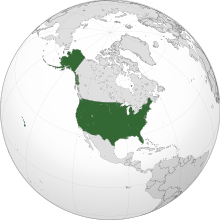 | |
| Capital | Washington, D.C. |
| Largest city | New York City |
| Official languages | None at federal level[a] |
| National language | American English[b] |
| Demonym(s) | American |
| Government | Federal presidential constitutional republic |
| Barack Obama (D) | |
| Joe Biden (D) | |
| John Boehner (R) | |
| John Roberts | |
| Legislature | Congress |
| Senate | |
| House of Representatives | |
| Independence from Great Britain | |
• Declared | July 4, 1776 |
| September 3, 1783 | |
| June 21, 1788 | |
| Area | |
• Total | 9,826,675 km2 (3,794,100 sq mi)[4][c] (3rd/4th) |
• Water (%) | 6.76 |
| Population | |
• 2013 estimate | 336,585,000[5] (3rd) |
• Density | 34.2/km2 (88.6/sq mi) (179th) |
| GDP (PPP) | 2013 estimate |
• Total | $16.724 trillion[6] (1st) |
• Per capita | $52,839[6] (6th) |
| GDP (nominal) | 2013 estimate |
• Total | $16.724 trillion[6] (1st) |
• Per capita | $52,839[6] (9th) |
| Gini (2011) | 47.7[7] high (39th (2009)) |
| HDI (2013) | very high (3rd) |
| Currency | [[]] ($) (USD) |
| Time zone | UTC−5 to −10 |
• Summer (DST) | UTC−4 to −10[e] |
| Driving side | right[g] |
| Calling code | +1 |
| ISO 3166 code | US |
| Internet TLD | .us .gov .mil .edu |
| |
The United States, officially the United States of America, is a country in northern North America. Its contiguous territory is bordered in the north by Canada, in the south by Mexico, in the west by the Pacific Ocean, and in the east by the Atlantic Ocean. Its non-contiguous territory extends the country's borders worldwide. At 4 square miles (9.83 square kilometres) in size, the U.S. is the fourth-largest country by total area.
America's mainland was settled by Paleo-Indians around 15,000 years ago; over the course of millennia, they developed complex societies and civilizations. Europeans colonized the continent beginning in the 16th century and, by the 18th century, Great Britain controlled vast areas of North America, including Thirteen Colonies in the Atlantic coast. After a series of protests over taxes, these colonies united to declare their independence in 1776, which they achieved in 1783. In the decades that followed, the United States became a regional power in the Western Hemisphere, undergoing a major territorial expansion under the doctrine of manifest destiny. The territorial integrity of the state was consolidated following a civil war over the issue of slavery , and the U.S. thereafter entered a Gilded Age of increasing industrialization, immigration, and social reform. In the twentieth century, the country's leading role in two world wars confirmed its status as a global superpower and a permanent member of the United Nations Security Council. After the end of a decades-long Cold War with the Soviet Union, the United States became the world's foremost economic, military, and technological power.
The United States is a federal republic divided into 50 states, 16 territories, a federal district, and various overseas extraterritorial jurisdictions. Its diverse geography include the vast Interior Plains, arctic Alaska, tropical Hawaii, the valleys of its Appalachian highlands, and the arid deserts of its Southwest region. It is a developed country with a very high Human Development Index. Its national economy is the world's largest, and it is fueled by an abundance of natural resources, a well-developed infrastructure, and a large manufacturing sector.
The U.S. population, estimated at 316 million, is the third largest in the world. Americans are multiethnic and multicultural, the product of over two centuries of large-scale immigration. The main spoken language is English, and a significant number of the nation's inhabitants also speak Spanish. At the forefront of its national identity, the U.S. has traditionally upheld the ideals of freedom, democracy, and opportunity.
Etymology
History
Prehistory
Native American and European contact
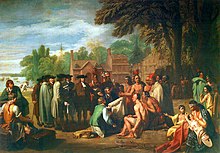
13 Colonies & French/Indian War
Independence & Constitution

Expansion & Monroe Doctrine
Civil War & Reconstruction

Gilded Age & Spanish-American War
WW I, Roaring 20s, Depression

New Deal, World Wars
Cold War Era & Space Race

Modern Era
Government
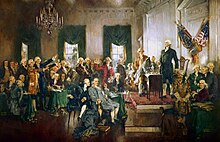
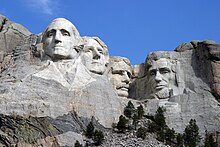
States and territories

Geography
Biodiversity
Economy
Science and technology
Demographics

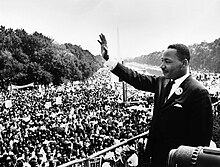
Culture
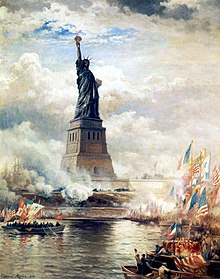
See also
- Index of United States-related articles
- Outline of the United States
- List of United States cities by population
- List of metropolitan areas of the United States
- List of official United States national symbols
- Template:Wikipedia books link
References
- ^ 36 U.S.C. § 302 National motto
- ^ Simonson, 2010
- ^ Dept. of Treasury, 2011
- ^ Cite error: The named reference
WFwas invoked but never defined (see the help page). - ^ "U.S. POPClock Projection". U.S. Census Bureau. (figure updated automatically).
- ^ a b c d "World Economic Outlook Database: United States". International Monetary Fund. 2013. Retrieved November 5, 2013.
{{cite web}}: Unknown parameter|month=ignored (help) - ^ "Income, Poverty and Health Insurance Coverage in the United States: 2011". Newsroom. United States Census Bureau. September 12, 2012. Retrieved January 23, 2013.
- ^ "Human Development Report 2013" (PDF). United Nations Development Programme. March 14, 2013. Retrieved March 14, 2013.
- ^ Cite error: The named reference
ILWwas invoked but never defined (see the help page). - ^ "Ecological Footprint Atlas 2010" (PDF). Global Footprint Network. Retrieved July 11, 2011.
- ^ "Statue of Liberty". World Heritage. UNESCO. Retrieved October 20, 2011.





